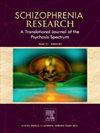Speaking of yourself: A meta-analysis of 80 years of research on pronoun use in schizophrenia
IF 3.6
2区 医学
Q1 PSYCHIATRY
引用次数: 0
Abstract
People with schizophrenia experience significant language disturbances that profoundly affect their everyday social interactions. Given its relevance to the referential function of language, aberrations in pronoun use are of particular interest in the study of schizophrenia. This systematic review and meta-analysis, adhering to PRISMA guidelines, examines the frequency of pronoun use in schizophrenia. PubMed, PsycINFO, Scopus, Google Scholar, and Web of Science were searched up to May 1, 2024. All studies analyzing pronoun frequency in various spoken language contexts in schizophrenia were included. Bias was assessed using a modified Newcastle–Ottawa Scale. A Bayesian meta-analysis with model averaging estimated effect sizes and moderating factors. 13 studies with n = 917 unique participants and 13 case-control contrasts were included. 37.9 % of patient samples were women, with a weighted mean (SD) age of 34.45 (9.72) years. 53.85 % of the studies were in languages other than English. We report a medium-sized effect for first-person pronoun impairment in schizophrenia (model-averaged d = 0.89, 95 % CrI (0.44, 1.33)). There was significant heterogeneity moderated by age. Evidence for publication bias was weak, with a strong support for first-person pronoun impairment after accounting for bias and heterogeneity. There was a small reduction of inter-individual variability in first-person pronoun use in patients compared to healthy controls (lnCVR = −0.12, 95 % CrI [−0.35, −0.13]). While all pronoun use was also high in patients, this was not robust due to heterogeneity and publication bias. Individuals with schizophrenia excessively use first-person pronouns. This may be a marker of a disturbed sense of self in this illness.
求助全文
约1分钟内获得全文
求助全文
来源期刊

Schizophrenia Research
医学-精神病学
CiteScore
7.50
自引率
8.90%
发文量
429
审稿时长
10.2 weeks
期刊介绍:
As official journal of the Schizophrenia International Research Society (SIRS) Schizophrenia Research is THE journal of choice for international researchers and clinicians to share their work with the global schizophrenia research community. More than 6000 institutes have online or print (or both) access to this journal - the largest specialist journal in the field, with the largest readership!
Schizophrenia Research''s time to first decision is as fast as 6 weeks and its publishing speed is as fast as 4 weeks until online publication (corrected proof/Article in Press) after acceptance and 14 weeks from acceptance until publication in a printed issue.
The journal publishes novel papers that really contribute to understanding the biology and treatment of schizophrenic disorders; Schizophrenia Research brings together biological, clinical and psychological research in order to stimulate the synthesis of findings from all disciplines involved in improving patient outcomes in schizophrenia.
 求助内容:
求助内容: 应助结果提醒方式:
应助结果提醒方式:


